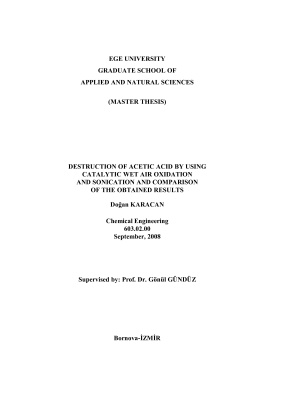EGE University, Izmir, 2008. — 158 p.
"Разложение уксусной кислоты при использовании каталитического окисления воздухом в присутствии воды и ультразвука, и сравнение полученных результатов".
Aim of Study. Waste Water Treatment. Physical Processes. Chemical Processes. Biological Processes. Incineration. Advance Oxidation Processes. Photolysis. Fenton’s Reagent Technique. UV/Ozone Oxidation. Photocatalysis. Wet Air Oxidation (WAO). Catalytic Wet Air Oxidation (CWAO). Sonication. Literature Survey of CWAO of Carboxylic Acids. Ultrasonic Degradation of Pollutants in Waste Water. Acetic acid can be formed during the destruction of chemicals including longer chain aliphatic acids or compounds like phenol. As known well, phenol is very toxic to human life. Acetic acid is resistant to oxidation because of the difficulty to oxidize the methyl group in α-position of the carboxylic group. In the oxidation schema of phenol, the route conducting to acetic acid is a dead-end. In addition, oxidation of acetic acid could be a rate determining step for destruction of many organic compounds (Barbier, 1998). Consequently, treatment may be required to protect the human health and also environment, to make the water acceptable to the senses of sight, smell and taste. Because of all these facts, destruction of acetic acid in waste water is very important.
"Разложение уксусной кислоты при использовании каталитического окисления воздухом в присутствии воды и ультразвука, и сравнение полученных результатов".
Aim of Study. Waste Water Treatment. Physical Processes. Chemical Processes. Biological Processes. Incineration. Advance Oxidation Processes. Photolysis. Fenton’s Reagent Technique. UV/Ozone Oxidation. Photocatalysis. Wet Air Oxidation (WAO). Catalytic Wet Air Oxidation (CWAO). Sonication. Literature Survey of CWAO of Carboxylic Acids. Ultrasonic Degradation of Pollutants in Waste Water. Acetic acid can be formed during the destruction of chemicals including longer chain aliphatic acids or compounds like phenol. As known well, phenol is very toxic to human life. Acetic acid is resistant to oxidation because of the difficulty to oxidize the methyl group in α-position of the carboxylic group. In the oxidation schema of phenol, the route conducting to acetic acid is a dead-end. In addition, oxidation of acetic acid could be a rate determining step for destruction of many organic compounds (Barbier, 1998). Consequently, treatment may be required to protect the human health and also environment, to make the water acceptable to the senses of sight, smell and taste. Because of all these facts, destruction of acetic acid in waste water is very important.

